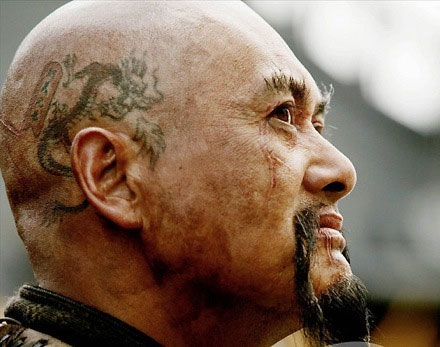Local hero Chow Yun Fat's journey to Hollywood

Chow as Captain Sao Feng in Pirates of the Caribbean 3, Flickr cc. Courtesy of sizemore.
The slippage of Chow Yun Fat’s cult star status into a floating signifier of ‘Asian-ness’ as defined by Hollywood mainstream production illustrates how foreign stars might be like other migrant ‘workers looking for a new career in a different market’ (Lo, 2005, p.132), supplying the industry’s much needed multi-ethnic diversity for its internal and international markets (Xu 2008).
The Hong Kong born actor Chow Yun Fat’s star status in the west has long been associated with the action genre, most notably John Woo’s seminal A Better Tomorrow 1 and 2 (1986, 1987) and The Killer (1989). These films were mainstream hits in Hong Kong that became reconstructed as excessive and cult in the west (Mathijs & Mendik, 2008). Woo’s Hong Kong action films are known to fans under the genre title of ‘heroic bloodshed’ – for their gun play, blood bath, male melodrama, consumption by subcultural groups, unique performance style, and sentimental, moral undertones. John Woo himself moved to Hollywood in the mid-1990s and went on to direct Face/Off (1997), Mission Impossible II (2000) and other mainstream films.
Chow’s initial star persona in the US was almost exclusively connected to the cool killer, gangster role while his career in his native city was much more typical of a generation of television-turned-film stars. Born to a poor family in a fishing community in Hong Kong, Chow started as a soap opera star, and he has been a down to earth, household name since the 1970s. By 1986, he had already spent nearly a decade acting in numerous, diverse genres including romance, historical drama and comedy that established him firmly within mainstream commercial cinema. Indeed, his ability to embody the rags-to-riches Hong Kong dream ensures his longstanding popularity among local and Chinese diasporic audiences. (For a brief overview of Chow’s career see this profile on Yes Asia.)
When Chow’s career dipped in the mid-1990s, he arrived in Hollywood at the height of the migration of Hong Kong film talents, Jet Li, Michelle Yeoh, Sammo Hung and Yuen Wo Ping. Like his predecessor Jackie Chan, who made several failed attempts to conquer Hollywood before being accepted, Chow’s US career was a reinvention that re-constructed his star image for mainstream consumption.
A star image developed within the specific context of Hong Kong and Chinese culture has clear roots in social reality but Chow’s image in Hollywood films indiscriminately embodies Chinese-ness and Asian-ness with little specific focus on the character’s origins and back-stories. Chow is an almost silent new migrant/hitman John Lee from China in Replacement Killers (1998); a bent cop Nick Chen associated with Chinese gangsters in The Corrupter (1999); Siamese king (Anna and the King, 1999); a mysterious, nameless Tibetan/Shaolin monk (Bulletproof Monk, 2003); Captain Sao Feng, a pirate lord of the South China Sea (Pirates of the Caribbean 3, 2007). Even the (lack of) names betray the blandness of some of these roles. Despite his increasing age (born 1955), many of the films continue to use his action persona, as seen in Bulletproof Monk in which Chow’s ancient martial arts master looks for and finds an unlikely white apprentice.
Chow works occasionally in Asia in high budget co-productions such as Crouching Tiger, Hidden Dragon (2000) and Curse of the Golden Flower (2006). However he says he enjoys the more relaxed lifestyle in California, living in a hillside home designed by Frank Lloyd Wright (Heard, 2000, p.228), hardly part of a subversive, challenging cult discourse.
References and further reading:
Heard, Christopher (2000) Ten Thousand Bullets: The Cinematic Journey of John Woo, LA: Lone Eagle.
Lo, Kwai-Cheung (2005) Chinese Face/Off: The Transnational Popular Culture of Hong Kong, Urbana & Chicago: University of Illinois Press.
Mendik, Xavier & Mathijs, Ernest, eds. (2007) Cult Film Reader, Maidenhead: Open University Press/McGraw-Hill.
Xu, Gary G., (2008) ‘Remaking East Asia, Outsourcing Hollywood’ in Hunt, Leon & Leung, Wing-Fai. eds., 2008, East Asian Cinemas: Exploring Transnational Connections on Film, London & New York: I.B. Tauris, pp.191-202.